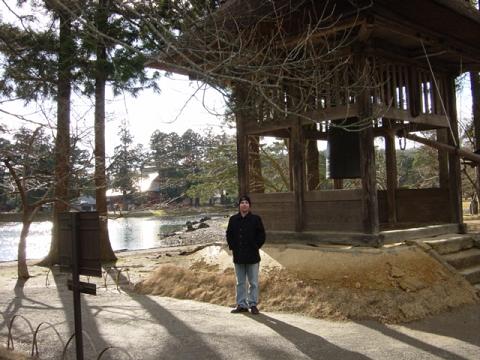What does a word mean?
Continuing from "Missing Out 1," I'm going to look at a four-kanji combination. The technical details about kanji are finished, so you can put away your kanji practice pads. I think this should show a deeper relationship between the written language and the culture.
"Isshokenmei" is a very common word in Japanese. If you watch TV for a day, you'll probably here it 5 or 10 or more times. After a year of living in Japan, a person who has only "picked up" the language may be using the word every day, or even more likely, hearing it at least once a day.
For a person that just picked up Japanese, our Jack Nova again, they might have heard the word and asked a bilingual Japanese friend, "What does 'isshokenmei' mean?" Their friend might have said "it means to try really hard." Japanese people love the idea of trying really hard.
Of course, that's a bit vague. It's almost like summing up the first manned mission to the moon as "a long trip."
Jack Nova might have even gone further and looked it up in a dictionary where it says "(adj-na,n) (1) very hard, with utmost effort, with all one's might, desperately, frantically, for dear life, all-out effort." That gives us a little bit more of an idea of what it means - the manned mission to the moon has switched from "a long trip" to "a ship went to space."
Let's look at the kanji (don't worry, this is going to be summed up pretty quickly):

The first kanji (on the left) means "one." You may laugh at the simplicity. The next kanji means "place" as in a place to go, the place where you live, tokyo is a place, a park is a place. Together, these two kanji mean what? "one place." Very simple.
Kanji 3, it looks scary, doesn't it. Its meaning is pretty easy though - it means "hang" as in "my job hangs on whether or not I can understand what chuukai means." And finally kanji 4 means "life" or "fate." So with 3 and 4 together we have "hang fate." These two mean what it seems - "at the risk of one's life" - your fate hangs on it.
So if we put all four together, "isshokenmei" means something like "at the risk of one's life at one place." We can see how this would mean something like "to try really hard." So as a person who understands some written language, basic kanji and readings and meanings, we've gotten a bit further into the meaning of the language, and that brings us closer to the culture. Now, the manned mission to the moon has switched from "a ship went to space" to "The US, under the Project Apollo (Apollo 11), sent three men to and from the moon in a ship for the first time in 1969." But is that the whole story? What did the whole thing mean for mankind? What discoveries were made? What were the crewmembers' names? What technological hurdles were overcome? So is that the end of the story?
Why were these four kanji chosen? "one place" "at the risk of one's life"... It seems sort of vague. Well, there's more to it.
In medieval Japan, samurai served landowners. As the landowners became more powerful by taking more land through conquest, they would become shogun. The samurai would inherit land in this way. This inherited land was considered equal to their life, something they needed to protect with all of their power. It would be the one place on which they would risk their life.
So when you use a word that you simply heard and equate with "try really hard," you're using a description of the life of feudal samurai from 700 years ago as they protect their land at the risk of their lives, all of the historical events and imagery of that time, the way of thinking of the Japanese throughout centuries, and a lot of principles (bushido, buddhism, shintoism, etc.) that still apply to today's culture of Japan.

No comments:
Post a Comment